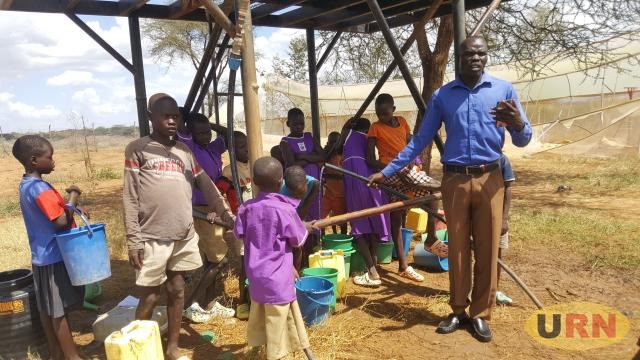
Napak, Uganda | THE INDEPENDENT | Water scarcity has become a pressing issue in primary schools across Napak district, compelling pupils to trek long distances to access clean water from neighboring communities. Currently, water coverage in primary schools throughout the district stands at 68 percent, with at least seven schools urgently requiring water facilities.
For instance, pupils at Alekilek Primary must travel over 5 kilometers away from their school premises to fetch water. Even schools equipped with water harvesting tanks and solar power systems are grappling with water scarcity due to exorbitant maintenance costs and prolonged drought, which has significantly lowered the water table.
Pupils report waking up as early as 6:00 AM to embark on lengthy journeys outside school grounds to fetch water from community boreholes, often returning to class late. This disrupts their studies and particularly affects the hygiene of girls, especially during menstruation.
Betty Nakiru, a pupil at Lodoi Primary School, expressed the challenges they face, including encounters with village boys along the way who demand sexual favors. Daniel Teko from Lokodiokodio Primary School highlighted the arduous journey of spending over 2 hours fetching water and facing demands for money from community members at the borehole.
John Lochonge, the school’s director of studies, emphasized how the water crisis disrupts learning, with pupils released during class hours to fetch water for preparing school meals. Ruth Akello, the senior woman teacher, underscored the impact on girls’ menstrual hygiene management and the safety concerns arising from their long walks for water.
Joyce Nakoya, the Napak District Education Officer, attributed the crisis to the prolonged dry spell, which has depleted water tables and rendered boreholes ineffective. Despite efforts to install solar-powered water systems, maintenance challenges persist due to financial constraints.
Nakoya appealed to the government and partners to address the water scarcity challenge, emphasizing the need for sustainable solutions to ensure students can focus on their education without being burdened by water-related challenges.
*****
URN
 The Independent Uganda: You get the Truth we Pay the Price
The Independent Uganda: You get the Truth we Pay the Price





